
Walid Kamal Jumblatt is a Lebanese Druze politician and former militia commander who led the Progressive Socialist Party from 1977 until 2023. While leading the Lebanese National Resistance Front and allying with the Amal Movement during the Lebanese Civil War, he worked closely with Suleiman Frangieh to oppose Amine Gemayel's rule as president in 1983. After the civil war, he initially supported Syria but later led an anti-Assad stance during the start of the Syrian Civil War. He is still active in politics, most recently leading his party, the Progressive Socialist Party (PSP) in the 2022 Lebanese general election.

René Moawad was a Lebanese politician who served as the 9th President of Lebanon. He served for 18 days, from 5 to 22 November 1989, before his assassination by unknown assailants.
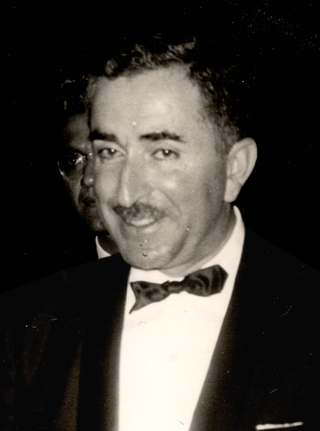
Rashid Karami was a Lebanese statesman. He is considered one of the most important political figures in Lebanon for more than 30 years, including during much of the Lebanese Civil War (1975–1990), and he served as prime minister eight times, making him the most democratically elected prime minister in history according to the Guinness Book of World Records 2005. He was assassinated in 1987.

Élias Sarkis was a Lebanese lawyer and President of Lebanon who served from 1976 to 1982.

Suleiman Kabalan Frangieh was a Pro-Syrian Lebanese politician who was President of Lebanon from 1970 to 1976.
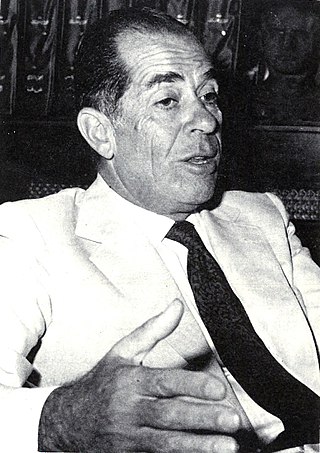
Raymond Eddé was a Lebanese Maronite statesman who served his country for many years as a legislator and cabinet minister. He led the Lebanese National Bloc, an influential political party. The son of former President Émile Eddé, Raymond Eddé was himself a candidate for the presidency in 1958, and was proposed for the post on numerous subsequent occasions. He is remembered for having held consistent views, which he refused to compromise for the sake of political gain. His supporters called him "Lebanon's Conscience." He was a strong nationalist, who opposed the French Mandate, and later, Syrian, Israeli, and Palestinian military intervention in Lebanon.

Saeb Salam was a Lebanese politician, who served as Prime Minister six times between 1952 and 1973. Following his death, the Lebanese daily As-Safir described Salam as "most successful in dealing with the media and in presenting a particular image of himself to people on a daily basis through wearing his customary carnation ... and expounding unforgettable slogans", and that he was Lebanon's most popular prime minister after independence leader Riad Al Solh. A significant aspect of Salam was that, unlike other Lebanese leaders, he did not act as a chief over a particular area in the country. Salam fiercely advocated the unity of Lebanon.

The presidentof the Lebanese Republic is the head of state of Lebanon. The president is elected by the parliament for a term of six years, which cannot be renewed immediately because they can only be renewed non-consecutively. By convention, the president is always a Maronite Christian who fulfills the same requirements as a candidate for the house of representatives, as per article 49 of the Lebanese constitution.

Abdallah El-Yafi was the Prime Minister of Lebanon serving twelve times between 1938 and 1969.
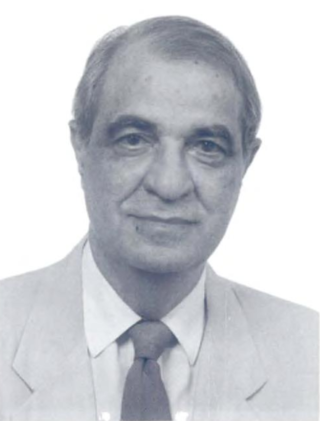
Amin al-Hafez was the prime minister of Lebanon from 25 April 1973 to 21 June 1973. He was also a long-running Member of Parliament for Tripoli in the Lebanese Parliament until 1996.
General elections were held in Lebanon between 18 August and 15 September 1996. Independent candidates won the majority of seats, although most of them were considered members of various blocs. Voter turnout was 43.3%.
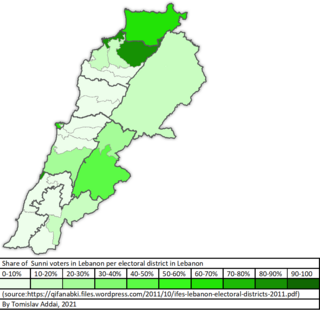
Lebanese Sunni Muslims refers to Lebanese people who are adherents of the Sunni branch of Islam in Lebanon, which is one of the largest denomination in Lebanon tied with Shias. Sunni Islam in Lebanon has a history of more than a millennium. According to a CIA 2018 study, Lebanese Sunni Muslims constitute an estimated 30.6% of Lebanon's population.
On January 10, 1971, a by-poll was held to elect a member of parliament from one of the Sunni Muslim seats from Chouf District in the Lebanese Chamber of Deputies. The constituency was a very sensitive area, as it was the home to arch-rivals Kamal Jumblatt and Camille Chamoun. The election was described by contemporary observers as the 'most fiery Lebanon had ever witnessed in a by-election'. There was a massive presence of security forces deployed in the constituency during the campaign and on the voting day in particular.

A series of rounds in the Lebanese presidential election were held from 23 April 2014 until 31 October 2016. No candidate reached a two-thirds majority vote in the first round, and subsequent rounds failed to gain a quorum. Finally, in the second round of the forty-sixth session held on 31 October 2016, Michel Aoun, a Member of Parliament and formerly a disputed Prime Minister and Acting President in a rival government near the end of the Lebanese Civil War, was elected with 83 votes in Parliament. He took office the same day as the 13th President of Lebanon since independence in 1943.
Khalil Abou Hamad (1936–1992) was a Lebanese lawyer who served as the minister of foreign affairs in the period 1970–1973.
Joseph Elias Tohme Skaf, was a Lebanese politician who is considered one of the most prominent personalities of the Skaff family in the city of Zahle. He held several ministerial positions from 1955 to 1988 under 5 different presidents which include Camille Chamoun, Fouad Chehab, Suleiman Franjieh, Elias Sarkis and Amine Gemayel.
Abdullah Rassi (1929–1994) was a Lebanese physician and politician. He worked as a physician in Saudi Arabia in the 1960s and following the election of his father-in-law Suleiman Frangieh as the President of Lebanon in 1972 he began to involve in politics. Rassi was a long-term member of the Parliament of Lebanon and served as the minister of interior between 1984 and 1988.
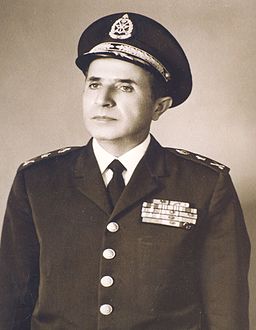
Iskandar Ghanem was a Lebanese army general who was the commander-in-chief of the Lebanese army in the period from 1971 to 1975. He was close to Suleiman Frangieh and held the post during his presidency.













